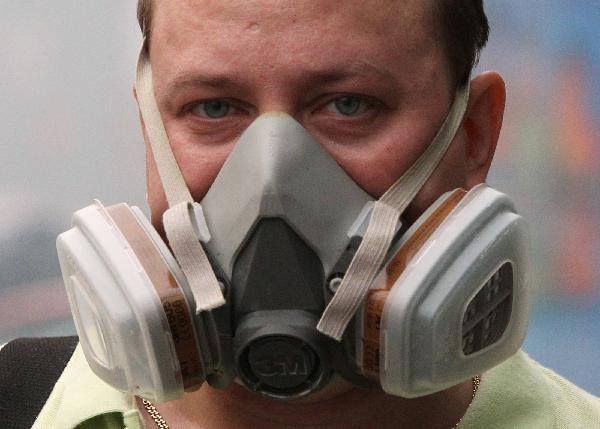Moscow mortality doubles
As the mortality rate in Russia's capital has doubled with the record-breaking heat and toxic smoke smothering the city, a record number of more than 100,000 passengers has departed Moscow in one day, local media reported Monday.
 |
|
A man, wearing a mask to protect himself from the smog, walks along a street in central Moscow August 9, 2010. Forest and peat fires caused by the hottest weather ever recorded in Moscow have killed at least 52 people, made more than 4,000 homeless, diverted many flights and forced Muscovites to wear surgical masks to filter out foul air. [Xinhua/Reuters Photo] |
"In common days, some 360 to 380 people die daily. Now, the number of deaths has increased to about 700. The mortality rate has doubled," Andrei Seltsovsky, head of the city's Health Protection Department, was quoted by RIA Novosti news agency as saying.
The abnormal high temperatures and smog, caused by peat bog fires, were blamed for the mortality rate rise. The smog pushed pollution levels to new highs on Saturday, threatening people's health.
Out of 1,500 places in the capital's morgues, 1,300 have been occupied, according to Seltsovsky. But he added that there were enough places in Moscow morgues.
The Novaya Gazeta paper cited an unnamed Moscow medic as saying that they were not to hospitalize people except for urgent cases.
Moscow ambulances are practically working in war-time conditions. The ambulances are not equipped with an air conditioning system and the temperature inside the vehicles sometimes even reached 50 degrees Celsius.
"Sometimes our doctors faint," Novaya Gazeta quoted the medic as saying.
"The daily routine is the most severe thing for us. None of the medical stations have drinking water for the emergency team. We buy it ourselves to water down the patients suffering the heat stroke," the doctor told the paper.
Novaya Gazeta said elderly people and the patients suffering from cardiovascular diseases are primarily at risk.
Meteorologists said Moscow will not be cleared from the smog until next week.
On Monday, a statement published on the Meteonovosti weather forecast website said that the poor ecological situation in Moscow will remain unchanged due to the ongoing southeast winds bringing peat bog smog into the city.
Health experts say that even healthy people may feel sick in these unfriendly conditions.
"People who suffer from heart or lung problems, diabetes, thyroid gland conditions or metabolic disease are dealing with (the ecological situation) extremely hard due to lack of oxygen in the air," the statement said.
Some people were forced to flee Moscow due to the heavy smoke, polluting the air with carbon monoxide 6.5 times the maximum allowable concentration.
A spokesman for the Russian Federal Air Transport Agency, Rosaviatsia, told media on Monday that some 104,044 passengers departed from Moscow's three airports on Sunday.
The passengers left Moscow's three major international airports for other cities within Russia and abroad, after a backlog of flights from delays over the weekend, the spokesman said.
The peak in the delay of air flights came on Saturday and the beginning of Sunday. However, the situation improved by Sunday evening.
According to the Rosaviatsia spokesman, 879 planes came to Moscow on Sunday, and 845 planes left the city.
 0
0 






